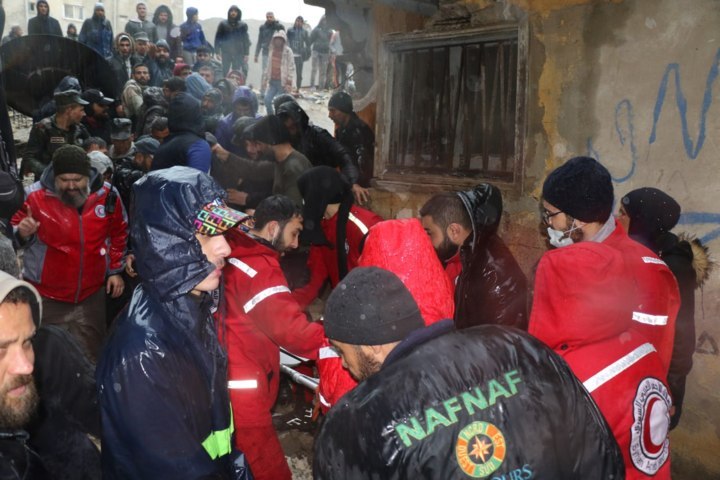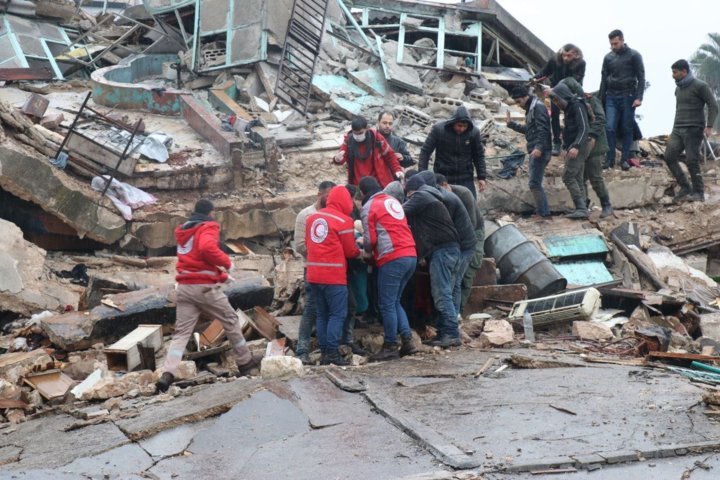
Turkey and Syria, the death toll rises to over 11,000. Aid from sixty countries
Turkey and Syria, rescue operations continue: according to Afad, about 8,000 survivors have been pulled from the rubble by search and rescue teams
The death toll of the earthquake that occurred in the night between Sunday and Monday in southern Turkey and northern Syria has risen to more than 11,000
According to figures provided by the Ankara Disaster and Emergency Management Authority (Afad), some 8,000 people lost their lives in the earthquake in Turkey.
In Syria, on the other hand, the number of victims would be more than 3,000. In this case, the figure was provided by international media while Damascus government channels report lower figures, updated as of yesterday.
According to Afad, some 8,000 survivors have been pulled from the rubble by search and rescue teams.
The Turkish government agency has deployed more than 96,000 workers and sent more than 5,000 vehicles to the field.
President Recep Tayyip Erdogan declared a three-month state of emergency in ten provinces of Turkey
The Head of State travelled today to the areas most affected by the disaster and first to Kahramanmaras, the capital of the province of the same name, where the epicentre of the first tremor with a magnitude of 7.8 on the Richter scale and a second tremor with a magnitude of 7.6 was located.
Other tremors followed yesterday and the day before, with epicentres in other southern provinces as well.
The international support received by Ankara was also impressive. According to the Anadolu news agency, some 60 countries from five continents have sent aid or search and rescue teams to the country, including the United States, Russia, China, Italy and the United Kingdom, but also countries experiencing economic hardship and widespread insecurity, such as Libya, which sent 55 people, and Lebanon, which sent 72 to the field.
Even countries with complex or absent diplomatic relations with Ankara, such as Greece and Armenia, sent aid and personnel.
Yerevan, according to the Ministry of the Interior, quoted by Public Radio of Armenia, has sent more than 20 search and rescue workers to the country.
Several countries have also announced that they are sending aid to Syria, on whose government, led by President Bashar al-Assad, there are, however, sanctions imposed by the international community.
According to the Moscow news agency Novosti, Russian soldiers are also in action: they have rescued at least 42 people.
TURKEY. EU SOURCES: AID TO ANKARA BECAUSE IT ASKED, SYRIA DID NOT
“The government of Turkey has explicitly asked the European institutions for help, while that of Syria has not.
That is why the EU Civil Protection Mechanism has only been activated for Turkey, while we send aid to the Syrian population via NGOs and UN bodies on the ground’.
So says a source inside the European Emergency Response.
The double earthquake that struck Turkey and northern Syria on Monday has already caused over 9,000 deaths on both sides and, as the World Health Organisation warns, the death toll could reach 20,000.
The cold, destroyed roads or roads full of rubble are slowing down the rescue of the missing and injured, but also hampering are the geopolitical dynamics affecting the two countries, with possible repercussions on the collective effort that is required of the international community to support the populations affected by the earthquake.
Turkey seems to be in an advantageous position: being a member of NATO and a strategic partner of the EU has allowed President Recep Tayyip Erdogan’s government to count on the immediate help of some of the richest countries in the world: not only has the EU already sent 28 teams of doctors and rescuers across 21 member states, but also the United States is participating with two teams specialised in this kind of natural disaster.
Indeed, President Joe Biden immediately telephoned his counterpart Erdogan to announce ‘all the humanitarian assistance’ the country will need.
Erdogan also scored a point by receiving words of closeness and support from Greek Prime Minister Kyriakos Mitsotakis.
There are still tensions between Turkey and Greece over the Cyprus issue, maritime borders and the exploitation of hydrocarbon resources in the Mediterranean, which are manifesting themselves in a race for naval rearmament and in the reception of refugees arriving via the Aegean.
THE SYRIAN SITUATION
The situation is very different for Syria. The country has been at war for 12 years and the government of President Bashar Al-Assad, which is accused of bombing civilians with the support of Russia, not only does not dialogue with the United States and the EU but is also subject to economic sanctions by Washington and Brussels, even though they have been committed for years to supporting humanitarian organisations to deal with the consequences of the conflict.
The Community of Sant’Egidio is among the bodies that have asked for these sanctions to be suspended in order to facilitate the access of aid to the people affected by the earthquake, and the United Nations has also called in recent hours for the opening of new corridors, a request that has reportedly been accepted by the United Kingdom, which is working to open new routes from Turkey.
Damascus’ historical allies have guaranteed immediate aid: Russia, Iran and Arab countries such as Egypt, Algeria, Jordan, Tunisia, the United Arab Emirates and Bahrain
The main problem, however, is that the earthquake also affected regions beyond Assad’s control, such as the governorate of Idlib and other areas under the control of Syrian- or Kurdish-led rebel groups or under Turkish occupation, such as Afrin.
Here, the Syrian Observatory for Human Rights directly accuses Ankara of ‘preventing relief efforts on the pretext that all vehicles are busy elsewhere’, and that civilians, with local volunteers, are working alone to extract civilians from the rubble.
And again: ‘There are no humanitarian, Arab or international organisations in the district of Jenderis – the one of the most seriously affected by the earthquake – because of the Turkish authorities’ refusal to open the Al-Hawa crossing’.
The White Helmets, the relief corps known as the Syrian Civil Defence, active in the north-west, shared a picture on social media of one of the relief sites from above: piles of rubble among which fires are lit to provide light but also “because of the temperatures, already below zero here”.
In the governorate of Homs, the situation is no simpler: ‘Imagine knowing that your family or friends are under the rubble and you are sitting on the ground, next to what is left of that building, not knowing how to save them,’ says Mohammad, a resident of Yalanqoz, a village north of Jenderis, who shares photos of a family of six – mother, father, two little sisters and two sisters-in-law – who were crushed.
“They were my brother’s neighbours, they died without being able to do anything,” he reports.
“Our priority now is to extract the trapped people and secure the injured and displaced, ensuring care and medicine,” finally reports Tommaso Della Longa, spokesperson for the International Federation of Red Cross and Red Crescent Societies (Ifrc).
The organisation immediately took action in Syria and Turkey by ‘mobilising 3 million Swiss francs from the emergency fund to support the Turkish and Syrian Red Crescent’.
Della Longa continues: ‘The situation is terrible in both countries.
In Syria, where we are particularly present in Hama, Aleppo, Latakiya and Tartous, there are the added difficulties of a country that has been at war for years: there are few heavy vehicles to remove the rubble, so it is more complicated to clear the roads, which have often also been destroyed by the earthquake.
Fuel is also scarce and in some areas there is only electricity for an hour a day’.
Many hospitals have also been damaged, which the Red Crescent could compensate for with mobile clinics, but “travel is difficult”, the spokesman concludes.
TURKEY AND SYRIA, SAVE THE CHILDREN: CHILDREN SLEEP IN CARS IN THE COLD FOR FEAR OF TREMORS
Freezing temperatures, damaged roads and airports are making it difficult for aid agencies and organisations to reach thousands of children and their families, who are in desperate need of assistance after Monday’s devastating earthquake, said Save the Children, the organisation that has been fighting for more than 100 years to save children at risk and ensure their future.
Thousands are now dead or injured in southern Turkey and northwestern Syria, with numbers steadily rising and people still trapped under rubble
Save the Children has activated the emergency response in the affected regions, where survivors are in dire need of shelter, blankets, food and medical care, in a scenario where, according to the World Health Organisation, some 23 million people, including around 1.4 million children, could be affected by the earthquake.
In Turkey, according to the latest data, some 5,775 buildings in 10 cities have collapsed and the population is without heating, electricity, aid, drinking water and communication services. Children are living in terror.
“I woke up to the sound of the TV falling to the floor. I quickly gathered my five children and my family and left the building.
We are currently housed in prefabricated containers where there are more than 20 children and their families who need help.
We have no access to gas, electricity and basic services. We are all upset. My cousin’s son is too scared to stay indoors and will now only sleep in the car,’ said Mustafa, 41, from Gaziantep.
Save the Children expresses its deep concern for the people in north-west Syria who have already had to leave their homes because of a conflict that has now lasted almost 12 years, and are living in camps for displaced people.
There are in fact almost 3 million internally displaced persons (IDPs) in north-west Syria and 1.8 million people are living in camps in the earthquake-affected area.
In these areas, Save the Children is working closely with partner organisations to assess the extent of the damage as the situation becomes clearer and provide the support the children need.
“It is incredibly cold in Syria right now.
We are very worried: many people, including children, may still be trapped under rubble, others are homeless and making do as they can, even sleeping in cars.
We are particularly anxious about children sleeping outside in freezing temperatures,” said Kathryn Achilles, Media and Communications Director of Save the Children Syria.
The scale of the devastation is such that everyone living in the affected area is affected, including Save the Children’s local partners and their families.
When the people delivering humanitarian aid also experience the same tragedy as those they are supposed to help, it becomes even more difficult to get much-needed aid into the region.
Due to damaged roads throughout Turkey and Syria, it is incredibly difficult to reach the affected areas
The international community must do all it can to support local humanitarian actors’.
In Turkey, Save the Children is working to assess needs and has established a team that will support the national emergency response throughout the region, in close coordination with the government and key stakeholders.
Save the Children teams on the ground are planning to support affected communities with winter and emergency kits, including blankets and warm clothing.
To support Save the Children’s emergency response, you can make a donation here: https://www.savethechildren.it/dona-fondo-emergenze#form-start
Read Also
Emergency Live Even More…Live: Download The New Free App Of Your Newspaper For IOS And Android
Earthquake In Turkey And Syria, The International Red Cross Initiative
Turkey And Syria, New Earthquake Tremors. The Death Toll Worsens: Over 5,000 Dead
Earthquakes And Ruins: How Does An USAR Rescuer Operates? – Brief Interview To Nicola Bortoli
Earthquakes And Natural Disasters: What Do We Mean When We Talk About The ‘Triangle Of Life’?
Earthquake Bag, The Essential Emergency Kit In Case Of Disasters: VIDEO
Disaster Emergency Kit: how to realize it
Emergency preparedness for our pets
Civil Protection Mobile Column In Italy: What It Is And When It Is Activated
Earthquake And Loss Of Control: Psychologist Explains The Psychological Risks Of An Earthquake
Earthquake In Indonesia, 5.6 Magnitude Tremor: Over 50 Confirmed Dead And 300 Injured
Panic Attack: What It Is And What The Symptoms Are
Rescuing A Patient With Mental Health Problems: The ALGEE Protocol
Earthquake Bag : What To Include In Your Grab & Go Emergency Kit
How Unprepared Are You For An Earthquake?
Emergency Backpacks: How To Provide A Proper Maintenance? Video And Tips
Earthquake and How Jordanian hotels manage safety and security
PTSD: First responders find themselves into Daniel artworks



